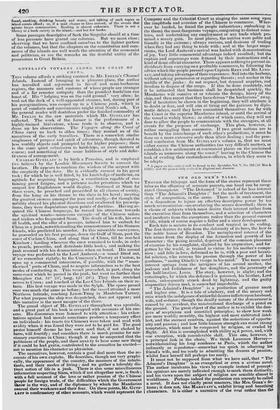TWO OLD MEN'S TALES.
THOUGH the titlepage and the form of the stories represent these tales as the offsprin g. of separate parents, one hand can be recog- nized throughout. "The Deformed " is indeed of far less interest than "The Admiral's Daughter ;" but the mode of treatment, the style of composition, is the same. There is in each somewhat of a disposition to injure an effective descriptive power by too much accumulation—an overlaying the scenes described; there is a choice of subjects which must derive their interest rather from the execution than from themselves, and a selection of characters and incidents from the exceptions rather than time general current of life, which of course require a fuller and a nicer development. Each tale is serious in its conduct and tragical in its ending. The first derives its title from the deformity of its hero, the heir to the noble house of Brandon. The metaphysical interest of the tale arises from the display of the formation and growth of his character : the pining invalid, deprived of the common pleasures of exercise by his complaint, slighted by his stepmother, and for gotten by the world, is trained to virtue by his mother's compa- nion ; and falls in love, deformed as he is, with a poor and beauti- ful relation, who returns his passion through the power of his goodness, " seeing Othello's visage in his mind." The mere novel interest springs from the intrigues of his second mother, the jealousy and foolishness of her daughters, and the generosity of his half-brother, Louis. The story, however, is slight; and the catastrophe, by which the deformed is poisoned, his brother, Lord Louis, subsequently struck dead by lightning, and the guilty stepmother driven mad, is somewhat improbable. " The Admiral's Daughter" is a production of greater merit and higher aim. It is a tale of adultery, and of the misery and ruin which the iudul gence of unlaw ful desires inflicts upon husband, wife, and seducer; though the deadly nature of the denouement is caused by an accident, the unintentional discharge of a pistol on the ground. The great object of the author is to exhibit the dan- gers of scepticism and unsettled principles; to show how weak are mere worldly morality, the highest and most cultivated intel- lect, and the sternest resolves, against the seductions of opportu- nity and passion ; and how little human strength can resist strong temptation, which must be conquered by religion, or evaded by flight. All this is accomplished with ability and power, and, with one exception, with considerable skill. This one, however, is a principal link in the chain.' We think Laurence Hervey— notwithstanding his long residence at Paris, which the author indirectly so reprobates—somewhat too quick in admiring his friend's wife, and too ready in admitting the dreams of passion, whilst Inez herself fall perhaps too easily. It must not be supposed from what we have said, that " The Admiral's Daughter" is an evangelical or even a serious novel. The author inculcates his views by example instead of precept: his opinions are merely indicated enough to mark them distinctly, and his views upon the subject of religion are sensible almost to worldliness. Perhaps indeed the production can scarcely be called a novel. It does not chiefly paint manners, like Mrs. GORE'S SC.. tions ; it does not, like MARRYATT'S, exhibit living and breathing characters. It is either a narrative of the vrai rather than the


















 Previous page
Previous page